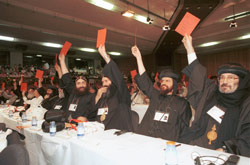
2003
YEARBOOK: THE CHURCHES IN ECUMENICAL FELLOWSHIP
![]() Special
Commission on Orthodox participation in the WCC
Special
Commission on Orthodox participation in the WCC
![]() Diakonia,
solidarity and relations with the churches
Diakonia,
solidarity and relations with the churches
SPECIAL COMMISSION ON ORTHODOX PARTICIPATION IN THE WCC
One of the decisions of the eighth assembly at Harare in December 1998 was to form a Special Commission on Orthodox Participation in the WCC. In the period leading up to the assembly, the difficulties in Orthodox-Protestant relations threatened the continuing Orthodox presence in the Council. The Georgian Orthodox Church had already withdrawn from WCC membership, and the Bulgarian Orthodox Church was soon to follow. The mandate of the Special Commission was to conduct a dialogue, with equal representation of the Orthodox and the other member churches, in which all the issues could come onto the table without fear that a majority would impose its views on a minority.

Delegates cast votes at the WCC's eighth assembly in Harare, December 1998. In response to recommendations in 2002 from its Special Commission on Orthodox Participation in the WCC, the Council is moving towards a system of decision-making by consensus rather than by majority rule.
In August 2002, the Special Commission presented its final report to the WCC central committee. This report was the fruit of intensive work by sixty Special Commission members through a series of plenary and sub-committee meetings from December 1999 to June 2002. The written record could only partially reflect the extraordinary experience of the participants, who grew together into a community through mutual engagement in prayer and discussion. The central committee received this report with gratitude and approved its recommendations. These proposals dealt with the five areas of concern which the Special Commission identified: (1) ecclesiology, (2) decision-making, (3) common prayer, (4) social and ethical issues, and (5) membership:
The report of the Special Commission and its possible implications for the future of the WCC have provoked many reactions. Some fear that the Council will lose its “prophetic voice” in social ethics; others are deeply concerned at a perceived devaluation of the wealth of ecumenical worship that has been so enriching for many Christians, across the boundaries of confession, tradition and culture. In many ways, the work of the Special Commission has touched the essence of ecumenism as a movement encompassing many traditions. The work of the Special Commission has clearly shown that many of the issues are not only Orthodox concerns but shared also by other churches, both members and non-members. The WCC shows a determination to move and grow together with the churches and other ecumenical partners.
In the context of the Special Commission’s work on membership, proposals have been put forward to strengthen member churches’ sense of collective representation on the governing bodies of the WCC, as well as their sense of mutual responsibility to one another. The member churches are being invited and encouraged to explore new ways of realizing Christian unity and accountability within conciliar fellowship.

With a decline in state-sponsored medical care, the Russian Orthodox Church has encouraged religious sisterhoods to provide health and service ministries to the elderly and other marginalized groups. Sisters in Novosibirsk care for patients in their homes or work with the staff in local hospitals.
At the same time, the council will continue in its diaconal mission of befriending the friendless and helping to empower the powerless in their struggle for dignity and for sustainable communities. This requires cooperation with member churches, but also with such other partners as world Christian communions, regional ecumenical organizations, church-related development agencies, national and international bodies, non-governmental organizations and other institutions of civil society. Through such relationships, the ecumenical movement is nurturing a holistic approach to, and building its capacities for, ministries that demonstrably meet human needs.
Leaders of the WCC see the deepening of relationships with and between the member churches and other ecumenical partners as ever more important. The fellowship becomes a reality when its members join in common study and action, engage one another on difficult questions, practise solidarity and uphold each other in prayer.
Back
to 2003 Yearbook index page
Next chapter: "Finances and organization"